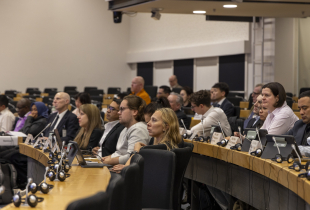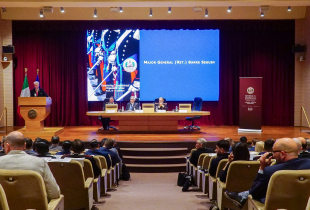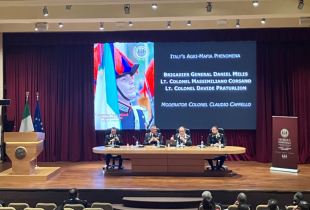
Marshall Center Language Class Serves as Springboard to Understanding the Fight Against Transnational Crimes
By: James E. Brooks
Public Affairs Office
George C. Marshall European Center for Security Studies
GARMISCH-PARTENKIRCHEN, Germany (Aug. 19, 2015) - From his home in Argentina, Fernando Gabriel Zarabozo traveled more than 7600 miles to learn techniques for countering narcotics, human trafficking and other transnational crimes. Ferdinand Assande made a similar journey of more than 3100 miles from his home in Cote d'Ivoire in Africa for the exact same reason.
They met each other and 14 others from 13 other countries on July 15, at the George C. Marshall European Center for Security Studies in Garmisch-Partenkirchen, Germany, to attend the three-week Countering Narcotics and Illicit Trafficking resident course that would begin five weeks later.
However, before starting the course where they would learn the strategies to combat transnational threats in their home countries, Zarabozo and Assande had to strengthen their English-language communication skills needed to wage the battle against crime.
Though they grew up thousands of miles apart, Zarabozo and Assande learned how to speak English during their school days.
"When I got to the Marshall Center, I thought I knew English pretty good," said Zarabozo. "But I discovered otherwise. "
Assande shared the same confidence with his understanding of the English language especially since he spent six months at an Army transportation command in Fort Eustis, Va., more than ten years ago. But that experience had eroded over time.
"It was very difficult when I arrived here. You can't find anyone to speak English with in Cote d'Ivoire. I kept my head down and didn't say much because I was afraid to make mistakes," Assande said.
To prepare Zarabozo, Assande, and the others, the Countering Narcotics and Illicit Trafficking-Language Program is a specially-tailored language program for participants who are scheduled to attend the three week CNIT resident course. For five-weeks prior to the start of CNIT, students who are moderately proficient in English are immersed in an English language curriculum designed specifically for the professional terminology necessary to combat counter narcotics, trafficking and other transnational crimes.
"Candidates are tested on their English language skills before they come here. They must have a good understanding and ability to communicate in English to not only be successful in completing the course work but also to become a strong partner in the professional, international network needed to defeat transnational threats," said Peggy Garza, chair of the English Language Programs Department for the Marshall Center's Partner Language Training Center Europe.
Zarabozo and Assende were joined by other professionals from Cabo Verde, Colombia, Japan, Nepal, Senegal, Afghanistan, Mongolia, Tanzania, and Uruguay. Though they had all passed the proficiency test to start the language course, the students found it wasn't just terminology they needed to learn.
"It was difficult to understand each other at first. We were speaking English but we all had our own different pronunciations. I had trouble understanding what my friends from Japan and Mongolia were saying because of their pronunciation," said Zarabozo.
Instructors George Anderson and Nancy Margalit divided the class in half. Vocabulary lists were handed out and each instructor made sure students were forced from their comfort zones, allowed to make mistakes, and by the end of the course, prepared to deliver a 25-minute speech in English using the vocabulary and terminology used in counter drug and counter trafficking operations.
"I didn't know I could speak that long in English," said Zarabozo. "The vocabulary and the discussions helped build trust and confidence."
Assande discovered keeping one's head down and not speaking out of fear of making a mistake wasn't an option.
"I was not used to learning this way. They would separate students if we started sharing in native tongues. This would've never happened in my country. But gathering people from different regions and cultures to learn English is a very good thing," he said.
And during these lessons, they learned more than just the common vocabulary that will aid them in their fight back home.
"We learned words like 'terrorism' together but we discovered there were cultural behaviors between us. What we believe is terrorism is different in each of our countries. We can't start to learn the vocabulary and understand the terms until we learned to understand how the other students from different countries thought. This is what's important in this course. We learned to respect each other," said Assande.
CNIT course 15-08 began Aug. 19 with 79 students from 49 countries. The 16 students from CNLP will represent less than a third of all CNIT students. For Zarabozo and Assande, they are the lone representatives from their respective countries. while Assande is the first participant from his country ever to attend a course at the Marshall Center.
"It's important to understand what the CNLP students accomplished. It's professional and personal development and these students wanted to improve. They chose to leave their families to live in a foreign country for eight weeks. Where they once had moderately proficient skills in speaking English, they will now be part of subject matter expert panel discussions during CNIT," said Professor Steve Monaco, the CNIT course director.
Welcoming the CNIT class on the first day, U.S. Army Lt. Gen. (ret) Keith Dayton, director of the George C. Marshall European Center for Security Studies, provided a bit of a pep talk to the students.
"You're here because your country thought it was important to take you off-line for a few weeks to be here. To be successful here and in fighting transnational crime requires getting to know each other and understanding each other," Dayton said.
For Assande, Zarabozo and their other 14 CNLP classmates, Dayton's words are not only understood but they carry a great deal of meaning.


